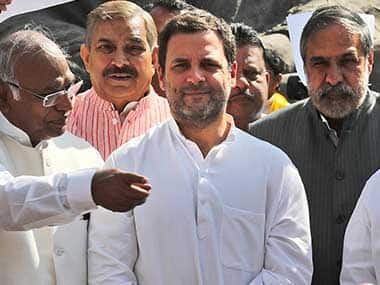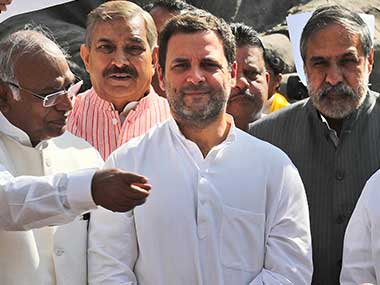Speaking at a media conclave on Friday, Congress president Rahul Gandhi remained confident that his party could work out a nationwide alliance with the Bahujan Samaj Party (BSP) for the 2019 Lok Sabha elections. His confidence stems largely from the fact that though BSP chief Mayawati had torpedoed a seat-sharing deal with the Congress in Madhya Pradesh and Rajasthan a couple of days ago, she had conceded the honesty which United Progressive Alliance chairperson Sonia Gandhi and Rahul showed in pursuing an alliance. Rahul helpfully pointed out that alliance in states and an alliance at the Centre were two different animals and the indications he had were that the two parties would ‘come together’ for the national elections. That is an imponderable. There would be little profit in expending time speculating on the possibilities, given the facts that the elections are a distance away and that Mayawati is a mercurial customer at the best of times. [caption id=“attachment_5249841” align=“alignleft” width=“380”] File photo of Congress president Rahul Gandhi. AP[/caption] But there’s something else that the Congress president also said is significant. “We were,” he said, “flexible in states. In fact, I was more flexible than some of our state leaders.” What does this mean? Quite obviously, it is a more nuanced re-statement of what Mayawati had said herself: that while the Gandhi’s were honest about the alliance, it was sabotaged by state Congress satraps. How far this is true, and in what exact way, is not the point, but that both Gandhi and Mayawati share this perception, is. This speaks volumes about the functioning of the Congress. It means that state leaders are free, ultimately, to decide on important aspects of party policy such as pre-election alliances. In a theoretical way, this might not be a bad thing. It is eminently desirable that vital party issues be debated and discussed at every level before a determination is reached. That theoretical position would work, however, if the Congress had had, in all other ways, a democratic institutional structure and culture. It doesn’t. Intra-party elections are a distant memory and legislature parties have no freedom to elect their leaders. The principle of electing a part of the Congress Working Committee was junked after the second split in the Congress in early 1978 led to the creation of the Congress (I) led by Indira Gandhi.
File photo of Congress president Rahul Gandhi. AP[/caption] But there’s something else that the Congress president also said is significant. “We were,” he said, “flexible in states. In fact, I was more flexible than some of our state leaders.” What does this mean? Quite obviously, it is a more nuanced re-statement of what Mayawati had said herself: that while the Gandhi’s were honest about the alliance, it was sabotaged by state Congress satraps. How far this is true, and in what exact way, is not the point, but that both Gandhi and Mayawati share this perception, is. This speaks volumes about the functioning of the Congress. It means that state leaders are free, ultimately, to decide on important aspects of party policy such as pre-election alliances. In a theoretical way, this might not be a bad thing. It is eminently desirable that vital party issues be debated and discussed at every level before a determination is reached. That theoretical position would work, however, if the Congress had had, in all other ways, a democratic institutional structure and culture. It doesn’t. Intra-party elections are a distant memory and legislature parties have no freedom to elect their leaders. The principle of electing a part of the Congress Working Committee was junked after the second split in the Congress in early 1978 led to the creation of the Congress (I) led by Indira Gandhi.
In the absence of an overarching democratic context, then, the freedom apparently given to state satraps — Kamal Nath in Madhya Pradesh and Sachin Pilot in Rajasthan — appears suspiciously like turf wars fought by other means. That is to say, neither Nath nor Pilot engaged with the high command about the wisdom of entering alliances in the spirit of a democratic freedom, rather they sabotaged negotiations by being formalistic and rigid.
From the point of view of the Congress’s larger interests, the failure to cement an alliance is bound to have adverse consequences both with regards to the Assembly elections, later this year, in the two states mentioned and the putative negotiations over a nationwide alliance for the 2019 elections. Gandhi was publicly optimistic when he said the failure to sign a deal would not have an adverse impact on his party’s prospects. But it certainly will in Chhattisgarh and Madhya Pradesh, where an alliance could have lengthened the odds on the existing regimes considerably. In Rajasthan, an alliance would have served as a token of good faith. In other words, Gandhi, or an emissary, should have been more involved in the minutiae of negotiations and asserted the high command’s jurisdictional authority. Another significant statement made by Gandhi pertained to his prime ministerial aspirations. He was undoubtedly diplomatic when he said he was a candidate for the top job if other parties in a proposed alliance were agreeable to his candidature. But in such matters it is hard to be too diplomatic. The Congress president would have been better advised to have let well alone. This is not the time to discuss prime ministerial ambition. Finally, Gandhi did come into his own when he took the Bharatiya Janata Party (BJP) on, headlong. He made several important points, all valid. First, he said that the time had passed when Prime Minister Narendra Modi could keep blaming the Congress for everything that was falling off the precipice: the economy mainly. The BJP will find it difficult to rebut the robustly pointed at the price the country was paying for ‘hatred’: the decimation of the economy signalled by the implosion of the stock market, the unchecked slide of the rupee, farmers’ suicides and much else.
Gandhi was also spot on when he said that the BJP had ‘gone to war with its own people because it wants to impose one singular, suffocating memory on our 1.3 billion memories’. In a limited way, Gandhi also spelt out his own position when he said ‘every person in the country has a stake’ in it. It was a gesture to a particular type of inclusiveness that, in Gandhi’s reckoning, embraced rich and poor, state action and liberalisation. Much of this is rhetoric, but as we have come to realise more than ever with the ascent of Modi, rhetoric is an inextricable instrument of politics.
It remains for Gandhi to translate this rhetoric into outcomes, which is the crucial, if unfinished, piece of business that will finally count. To do this he will have to streamline his party so that it works as a synchronic chorus, rather than singing from a perplexing array of hymn sheets. He will have to ensure that the party pursues the issues he has been indefatigably hammering away at, at every possible level. Unfortunately, the Congress has not been attacking the BJP on its beleaguered fronts with anything like energy and vigour. If that is the result of a lack of conviction and a loss of morale, it will be up to the boss to inject adequate quantities of both into the party.
)